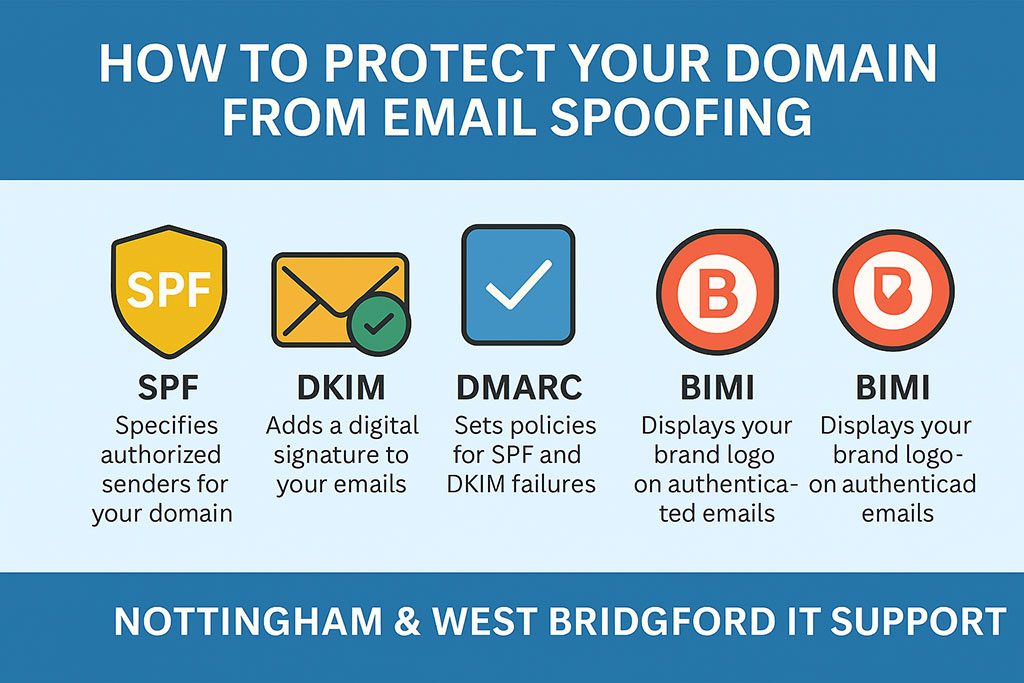
Email spoofing is one of the most dangerous and frustrating threats businesses face today, especially in a digitally connected region like Nottingham and West Bridgford. If you're running a business and communicating with customers by email (which most are), spoofers can impersonate your domain, trick your clients, and cause serious damage.
At The Red Penguin Group, we’ve helped countless local businesses prevent these attacks with proactive email security strategies. In this guide, we’ll explain what email spoofing is, why it’s a threat, and how to stop it using tools like SPF, DKIM, DMARC, MTA-STS, BIMI, and why Microsoft’s latest move matters.
What Is Email Spoofing?
Email spoofing is when a cybercriminal fakes the "From" address of an email to make it look like it’s coming from your domain. Their goal is to trick your recipients into trusting the message—often leading to phishing attacks, malware, or fraud.
Why This Matters for Nottingham & West Bridgford Businesses
For any company—whether you're a solicitor in West Bridgford, an estate agent in Nottingham, or a local service provider—email spoofing can:
- Damage your reputation and brand trust
- Get your domain blacklisted by spam filters
- Result in data breaches or financial loss
- Lead to GDPR compliance issues
Microsoft’s Upcoming DMARC Enforcement – What You Need to Know
In 2024, Microsoft began rolling out stricter enforcement of DMARC policies across its email platforms (including Outlook, Exchange Online, and Microsoft 365). Starting in 2025, Microsoft will fully enforce DMARC for inbound emails, meaning:
- Emails that fail DMARC and come from unauthenticated domains may be rejected or quarantined
- Businesses that don’t have proper SPF, DKIM, and DMARC configurations may find their emails blocked or delivered to spam, even when contacting Microsoft-based recipients
Why This Matters for Your Business
If you email clients, partners, or suppliers who use Microsoft 365 (which many do), your emails could stop reaching them unless your domain is correctly configured.
What you should do now:
- Ensure your SPF and DKIM are set up and passing
- Publish a DMARC record—even in monitor mode
- Gradually move toward a “quarantine” or “reject” policy
- Monitor your domain to identify issues early
Need help? Our local IT team in Nottingham and West Bridgford can audit your domain and configure everything to meet Microsoft’s new requirements, before your emails start bouncing.
Our Full Email Security Checklist
We use a layered approach to help businesses in Nottingham and West Bridgford lock down their domains and emails. Here's how:
✅ SPF (Sender Policy Framework)
Defines who can send email on your behalf
✅ DKIM (DomainKeys Identified Mail)
Digitally signs your email to prove it's from you
✅ DMARC
Tells mail servers what to do with emails that fail SPF/DKIM
✅ MTA-STS
Ensures your emails are encrypted in transit
✅ BIMI
Displays your logo in email inboxes, reinforcing trust
Bonus Security Tips
- Enable Multi-Factor Authentication (MFA) on all accounts
- Regularly audit access and forwarding rules
- Use DMARC monitoring tools
- Train staff to spot phishing scams
Real-World Support, Right Here in Nottingham
At The Red Penguin Group, we take pride in helping businesses across Nottingham and West Bridgford secure their emails, protect their brands, and stay compliant. Whether you're just getting started with email security or need help meeting Microsoft’s new standards, we’re here to support you.



